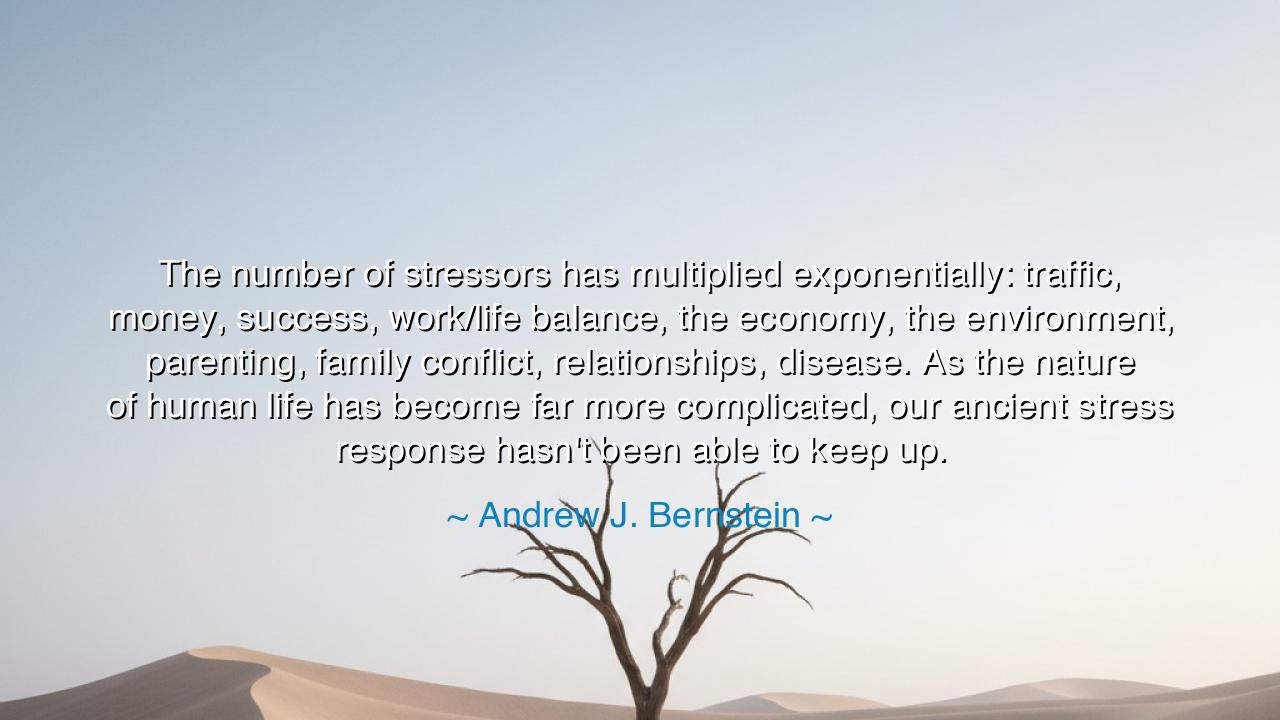
The number of stressors has multiplied exponentially: traffic
The number of stressors has multiplied exponentially: traffic, money, success, work/life balance, the economy, the environment, parenting, family conflict, relationships, disease. As the nature of human life has become far more complicated, our ancient stress response hasn't been able to keep up.






The words of Andrew J. Bernstein strike at the very core of our human struggle: “The number of stressors has multiplied exponentially: traffic, money, success, work/life balance, the economy, the environment, parenting, family conflict, relationships, disease. As the nature of human life has become far more complicated, our ancient stress response hasn't been able to keep up.” In this truth, he reveals the clash between two forces: the ancient body crafted by evolution to fight or flee, and the modern world with its unending torrent of demands. What once saved us from the predator in the wild now falters before the chaos of deadlines, screens, and unspoken expectations.
The ancients faced dangers that were simple though fierce—storm, famine, beast, and war. Their bodies answered with swift surges of strength, the pounding of the heart, the quickness of the breath. This stress response was their shield, honed across millennia. Yet in our age, the threats have changed. No lion crouches in the grass, but the heart races as though it does, before unpaid bills, before the burden of parenting, before the weight of careers, relationships, and global uncertainty. Bernstein names the tragedy: our bodies remain ancient, but our world has multiplied its stressors beyond measure.
History itself testifies to this mismatch. Consider the industrial revolution, when millions left the simplicity of farms to toil in factories. The rhythm of nature gave way to the relentless ticking of the machine, and people grew weary under pressures their ancestors had never known. Diseases of the body and spirit—overwork, exhaustion, despair—spread like fire. Then, as now, humanity discovered that the old responses of fight and flight could not alone withstand the new complexities of life. Instead, new ways of coping, new wisdom, and new communities of care had to be forged.
Bernstein’s words carry both warning and hope. The warning: if we allow our ancient stress response to rule us in a modern world, it will break us. We cannot fight traffic with fists, nor flee from the weight of a mortgage. To react with fear and rage to every modern burden is to burn the body and poison the spirit. The hope: knowing this, we may choose to rise higher. We may cultivate new responses—patience, mindfulness, compassion, and perspective—that allow us to endure and even thrive amid the storm.
His mention of parenting as one of life’s stressors is especially poignant. To raise children in a world of uncertainty is no small trial. Yet if we as parents do not learn to master our stress, our children inherit it. They see in our impatience and anxiety a model for their own lives. But if we instead learn calm, resilience, and balance, then we pass on a gift greater than wealth: the ability to face life’s pressures with courage and peace.
The lesson here is both urgent and timeless: though our bodies are ancient, our wisdom can be new. We must learn to pause, to breathe, to question whether the enemy is real or imagined. We must train our minds to see that not every stressor is a predator, not every challenge is a crisis. The modern world requires not only strength of body but clarity of soul. To master stress is to reclaim dominion over our own lives.
Practically, this means cultivating practices that soothe and strengthen: meditation, prayer, or stillness at dawn; walks in nature to remind the body of its true rhythms; honest conversations to release hidden burdens; and boundaries to protect the soul from endless noise. It means remembering that while we cannot silence the world’s chaos, we can learn to steady our own hearts within it.
Thus, Bernstein’s words endure as both lament and call to action: the nature of human life has grown complicated, but we need not remain slaves to an outdated response. If we dare to seek new ways of meeting life’s trials, then what once threatened to destroy us can instead become the forge that refines us. And in that refinement, we will pass to our children not the weariness of a stressed spirit, but the strength of a soul that has learned to live fully in a complicated age.






AAdministratorAdministrator
Welcome, honored guests. Please leave a comment, we will respond soon